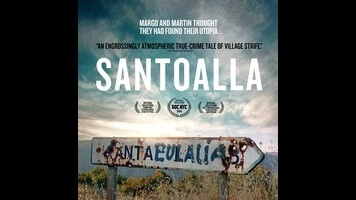Santoalla over-teases a rural true-crime story

In 2010, Martin Verfondern, a teddy-bearish, German-born Dutch citizen in his early 50s, vanished with his car in a remote, mountainous part of the northern Spanish region of Galicia. Since the 1990s, he and his wife, Margo Pool, had run an organic farm and backpacking retreat in Santoalla, a dilapidated Galician village that rested at the bottom of a valley, as though it had slid there. They had met as anti-gentrification protesters and first caught sight of Santoalla while traveling across Europe in an RV. They would become the village’s only year-round residents, aside from the Rodriguezes, an elderly couple who lived with their two middle-aged sons. For years, Verfondern had been entangled in legal and sometimes physical disputes with these neighbors, who had fought everything from his attempts to fix up the largely abandoned village to his applications to be granted legal status as a resident of the area. He had become paranoid, videotaping his interactions with the Rodriguez family and spying on them from across the field. If Verfondern had in fact been the victim of foul play, the Rodriguezes were the first and only suspects.
Every documentary has to make the most of the footage it has, but Santoalla, directed by first-timers Andrew Becker and Daniel Mehrer, has the additional disadvantage of bad timing; most of it was filmed in 2013, meaning that Becker and Mehrer’s cameras weren’t present for either the beginning or the end of the story. But while news reports and the large archive of videos left behind by Verfondern help fill in some gaps, any interest that Santoalla might hold as a work of true-crime documentary is limited by the fact that it only offers glimpses of the personalities involved—chiefly Pool, the main interviewee, and one of the Rodriguez sons, Julio, who possesses just about the worst poker face anyone accused of murder could have—in the middle of a slow, protracted second act. And it’s not like this is a tangled or twisty mystery, which makes Becker and Mehrer’s heel-dragging annoying in spots. On top of that, it never tames the dark, almost satirical irony behind Verfondern’s disappearance: that he and Pool fought gentrification in Holland, only to be greeted with violent hostility as gentrifiers when they came to Galicia.
It’s not clear whether we are past the point of peak true crime, or whether there will come a time when every death or disappearance to ever happen in a small town will be turned into a documentary, premium cable or streaming miniseries, or multipart podcast. A story is only as interesting as what can be drawn from it, and Becker and Mehrer seem reluctant to draw too much, perhaps realizing the confines they have to work within; even at a scant 83 minutes, the movie feels over-stretched. But it’s at least more artful than the average true-crime doc, mostly in its fluid handling of Pool and Verfondern’s backstory, cut together from interviewees with Pool conducted around the farm where she still lives, and archival materials—everything from videos of their medieval-dress civil wedding to the folk songs Verfondern would tape and send during trips abroad to photos from the years they spent traveling around before settling in Santoalla. These tell a story that’s more interesting than the limbo of non-answers and landscape shots that Becker and Mehrer try to tease into a mystery.